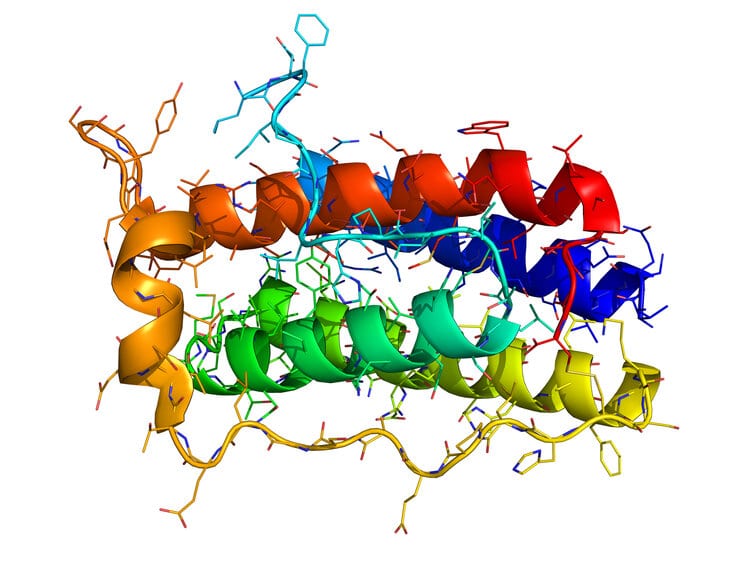You may have landed on this page having never even heard of leptin.
But leptin is actually considered the most important hormone in the body. It plays a regulatory role for other major hormones such as thyroid hormones, adrenal hormones, sex hormones (like estrogen and testosterone), and pancreatic hormones.

Let that sink in. Leptin influences all of those hormones!
Leptin is secreted by fat tissue. It signals to the brain that there is either enough storage of fat tissue OR not enough.
Other tissues such as muscle, the liver, and pancreas also utilize leptin in energy regulation.
When there is enough energy (fat tissue) and sufficient calories in the diet leptin goes up and the brain and other tissue react by increasing metabolism.
So, high leptin equals a higher rate of metabolism.
If someone is chronically starving or following very-low-calorie diets then leptin goes down and the metabolism slows down.
I repeat, by not eating enough you are lowering your levels of leptin, which slows your metabolism….making it harder for you to lose weight!
Leptin plays a protective role, helping us avoid storing too much fat or slowing metabolic processes down during “starvation” to conserve energy.
Excess fat tissue results in excess leptin.
So, when someone has overweight or obesity they will have ongoing elevated levels of leptin.
Over time this creates “leptin resistance”.
If you know about insulin resistance then you understand that when cells are perpetually stimulated by a hormone they eventually turn down the production of receptors that bring that hormone into the cell.
This is again, a protective mechanism. The cell can only react to so much of a given hormone. The same thing happens in the brain and other tissue when there are chronically elevated levels of leptin.
When there is leptin resistance then cells register the state as low leptin.
This means with leptin resistance the brain will down-regulate the metabolism and other tissues will not be able to utilize leptin effectively.
This is very, very bad for a person with overweight or obesity who is trying to lose weight.
And what often happens is that people get frustrated because they have difficulty losing weight and then reduce calorie intake even more.
This makes the situation even worse. The body registers this as starvation, further down-regulating metabolism.
There is a blood test for leptin but it is unnecessary in most cases because a simple look in the mirror will tell people whether or not they have too much leptin.
And if the excess weight has been there for any extended length of time it is a given that there is leptin resistance occurring. Other signs of leptin resistance are sluggishness and fatigue and excess heat after workouts.

Unfortunately, it is very common for people with obesity to have inflammation, high blood sugar, high cortisol, poor sleep, leptin resistance, insulin resistance, adrenaline resistance, and excess estrogen causing a perfect storm of blockers against weight loss.
Obviously, the path to fixing this is losing weight but if you CAN’T lose weight this can be very frustrating.
Addressing leptin, stress, sleep, and inflammation first is a very sound approach.
For stress management, I suggest reading this blog post for “My Top 6 Stress-Busting Activities”.
For sleep, I suggest reading this blog post for “6 Ways to Improve Your Sleep Right Away”.
And for reducing inflammation, I have several past blog posts to check out:
“Food and Fitness for Better Immune Function”
“A Rational Guide to Boosting Immune Function”
And for leptin, the following practices have been shown to help balance leptin and reduce leptin resistance.
- Regular exercise is key. Exercise should be moderate and in the aerobic zone. Aim for 2-3 longer, moderate exercise sessions. If you have obesity then walking is an ideal form of exercise to start with because it puts less stress on joints. This blog post goes into detail about heart rate cardio training; how to do it and why it’s so important.
- Strength training is also very important (this also reduces insulin resistance).
- Be sure to eat when hungry and only eat when hungry (so avoid unnecessary snacks).
- Do not eat after dinner. Finish your last food at least 3 hours before bed.
- Always allow a minimum of 12 hours of fasting nightly.
- Eat 2-3 meals each day and do not snack in between meals.
- Eat slowly and do NOT overeat. Eat until you are satisfied only.
- Eat mindfully (read Masterful Eating)
- Avoid eating high-carb breakfasts and be sure to include protein and fat in your breakfast.
- Supplement with CoQ10 200-300 mg/daily or on days when you work out.
- Ensure adequate supplementation and dietary intake of B vitamins and magnesium.
If you’re serious about improving your health and improving your relationship with your body but you’re not sure where to start, I recommend getting on a free clarity call with me. Click the link below.
1. http://www.cell.com/cell-metabolism/fulltext/S1550-4131(13)00200-3 Leptin at the Intersection of Neuroendocrinology and Metabolism: Current Evidence and Therapeutic Perspectives
